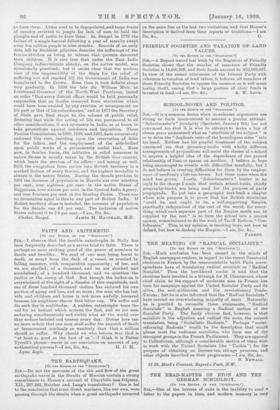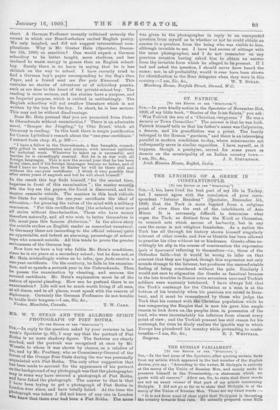THE HEAD-MASTER OF ETON AND THE GERMAN SCHOOLBOY. [To T
10 EDITOR 07 TIE " SP ROTATOR."' SLE,—One of the horrors of exile is the inability to send a letter to the papers in time, and modern memory is verY
short. A German Pr6fessor recently criticised severely the accent in which our Board-scholars recited English poetry.
We only laughed, and did not suggest international com• plications. Why is Mr. Gustav Hein (Spectator, Decem-
ber 5th, 1908) so sensitive P One would expect a German schoolboy to be better taught, more studious, and less inclined to waste energy in games than an English school- boy. Surely there is no harm in saying that he is less skittish on the way to school. I have recently tried to
find a German boy's paper corresponding to the Boy's Own Paper, and a friend sent me .Der gute 'Ca merad. This contains no stories of adventure or of schoolboy pranks. such as are dear to the heart of the private-school boy. The reading is more serious, and the stories have a purpose, and an Imperial purpose, which is rubbed in unblushingly. The English schoolboy will not swallow literature which is not written by the boy for the boy. In short, he is less serious.
This may not be without disadvantage.
Does Mr. Hein pretend that you are promoted from Unter- to Obersekunda without examination P There is an admirable
novel, " Semper der Jangling," by Otto Ernst: which all Germany is reading: In this book there is ample justification for Canon Lyttelton's remark about the "one-yeas' certificate." I extract from chap. • 41, p. 309 :— " I have a fellow in the Untersekunda, a fine bumpkin, remark- ably gifted in mathematics aud science, with unusual aptitude for technical work. Whatever be takes up is successful, and besides he is exceedingly musical. But he is at war with all foreign languages. This is now the second year that he has boon in my class,And if his foreign languages become no better, and of that I have no hope, then at Easter he will be there still and Without the one-year certificate. I think it very possible that after seven years of anguish and toil he will shoot himself."
In the result this boy finds himself, "for the secOnd time, hopeless in front of this examination" ; the master secretly lets the boy see the papers, the fraud is discovered, and the master commits suicide. The masters in this book ridicule the' State for making the one-year certificate the ideal of
edneation,—for greasing the valves of the mind with a military remission. " For this certificate they [the scholars] must now all strive without discrimination. Those who have money therefore naturally, and all who wish to better themselves in life, must pass this famous Abiturium." In the above story the suicide strikes an English reader as somewhat unnatural. In Germany there are (according to the official returns) quite au appreciable, and indeed an alarming, percentage of school- boys who commit suicide. All this tends to prove the greater seriousness of the German boy.
Now here we have a boy who fulfils Mr. Hein's conditions, since he is six years at a secondary school ; but he does not, as
Mr. Hein misleadingly wishes us to infer, ipso facto receive a one-year certificate. On the contrary, he fails in his examina- tion, and so spends a seventh year in the Untersekunda. Then
be passes the examination by cheating, and secures the coveted certificate. Mr. Hein's explanation must be of the nature of special pleading. How can he pretend there is no examination P Life will not be much worth living if all men, at all times, and in all places, must speak with the reserve of diplomacy. Certainly the German Professors do not trouble to bridle their tongues.—I am, Sir, &c.,





































 Previous page
Previous page